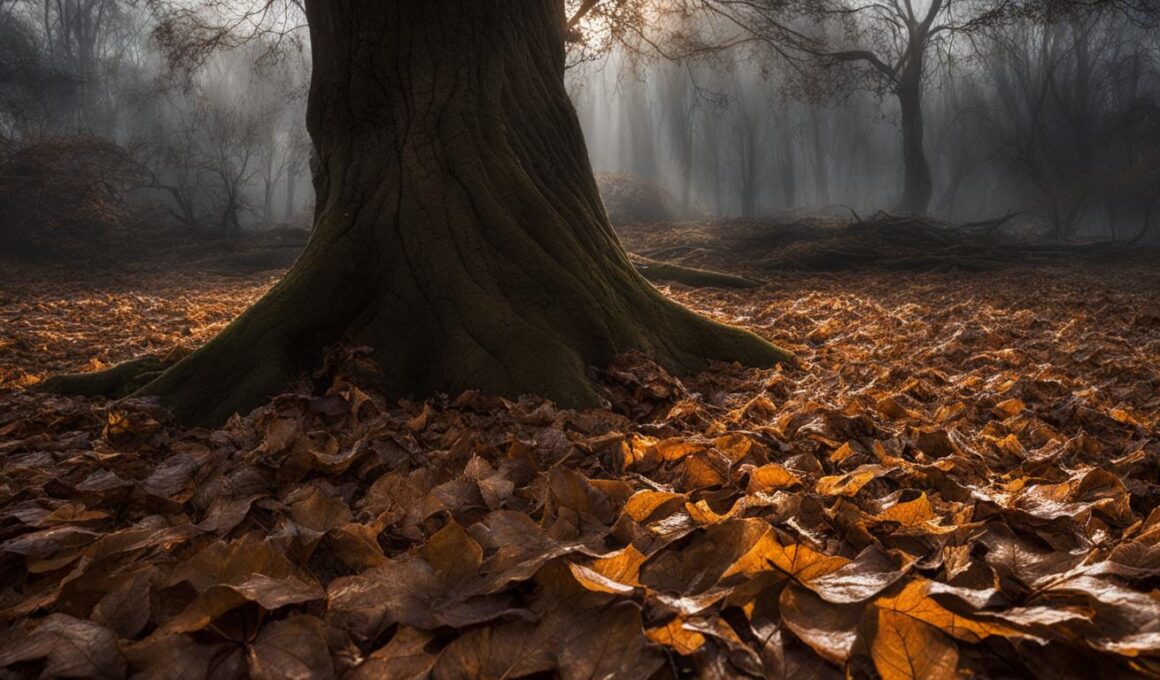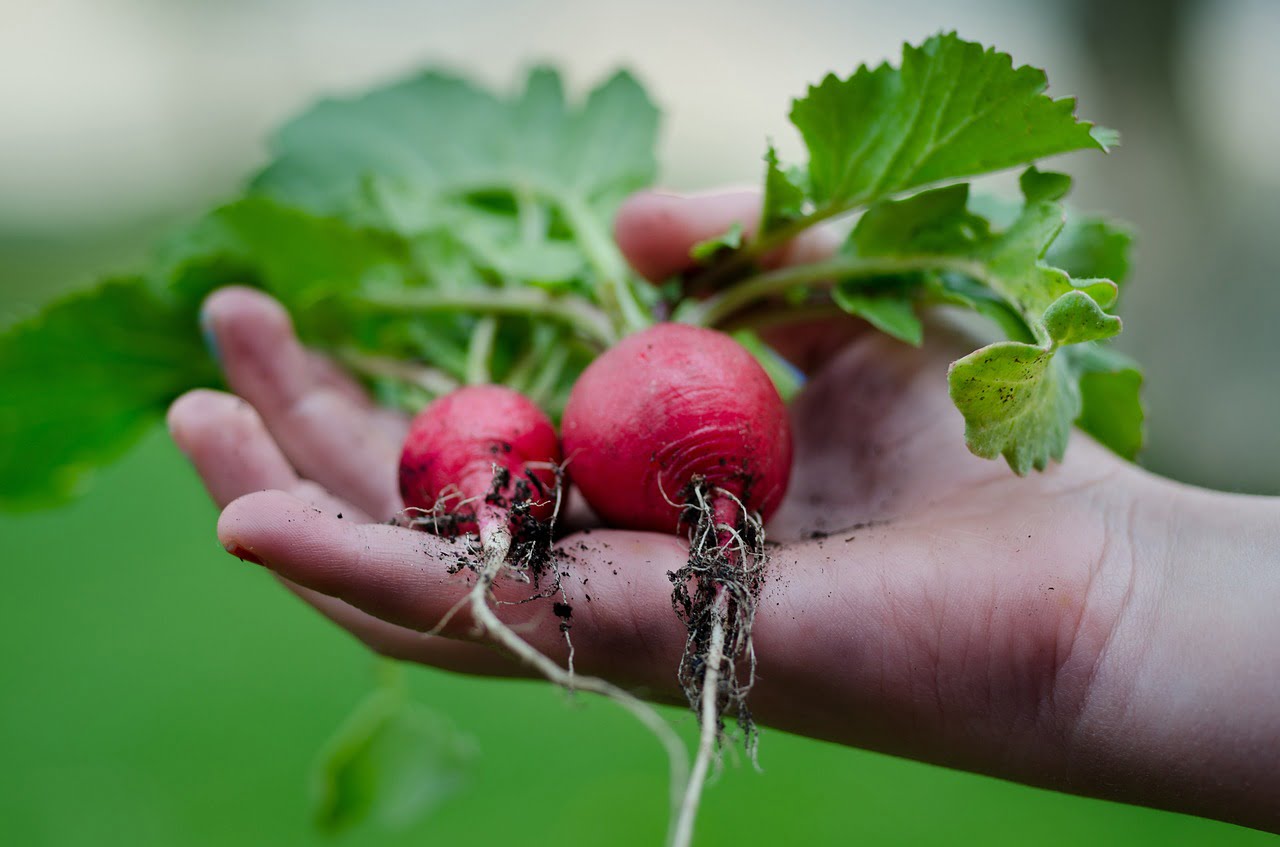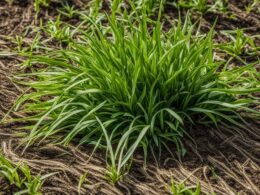Have you ever wondered if dead leaves can actually benefit your plants and help them grow? While dead leaves may not be suitable for every area of your garden, they can be valuable resources when used correctly. Let’s explore how dead leaves can enrich your soil, improve plant health, and contribute to the overall well-being of your garden.
Post Summary:- Dead leaves can decompose and return valuable nutrients to the soil, benefiting plant growth.
- Chopping or shredding leaves before using them as mulch prevents negative effects on plant health.
- Mowing over dead leaves can distribute them as mulch throughout your lawn, promoting lawn health.
- Dead leaves can be used to create nutrient-rich compost for fertilizing your plants.
- Using dead leaves as mulch helps retain moisture in the soil and suppresses weed growth.
How Dead Leaves Improve Lawn Health
Mowing over dead leaves can have significant benefits for maintaining a healthy lawn. By distributing the leaves as leaf mulch throughout the lawn, you can prevent the growth of moss and promote the development of robust root systems in your grass. Instead of seeing dead leaves as a hindrance, they can become a valuable addition to your lawn.
When you mow over dead leaves, you break them up into smaller pieces, creating a natural mulch that enriches the soil. This leaf mulch helps retain moisture in the soil during dry spells, keeping your lawn hydrated and nourished. It also acts as a protective layer, preventing weeds from taking over and competing with your grass for nutrients and sunlight.
Using a lawn mower to shred the dead leaves before incorporating them into your lawn is recommended. This process ensures that the leaves are adequately chopped up and distributed evenly. Keep in mind that it’s best to mow over dry leaves to avoid difficulties during shredding.
By utilizing dead leaves as leaf mulch, you can improve the overall health and appearance of your lawn. Not only will you prevent moss growth, but you’ll also foster the growth of strong, resilient grass roots. Embrace the natural beauty of fallen leaves and let them work their magic on your lawn.
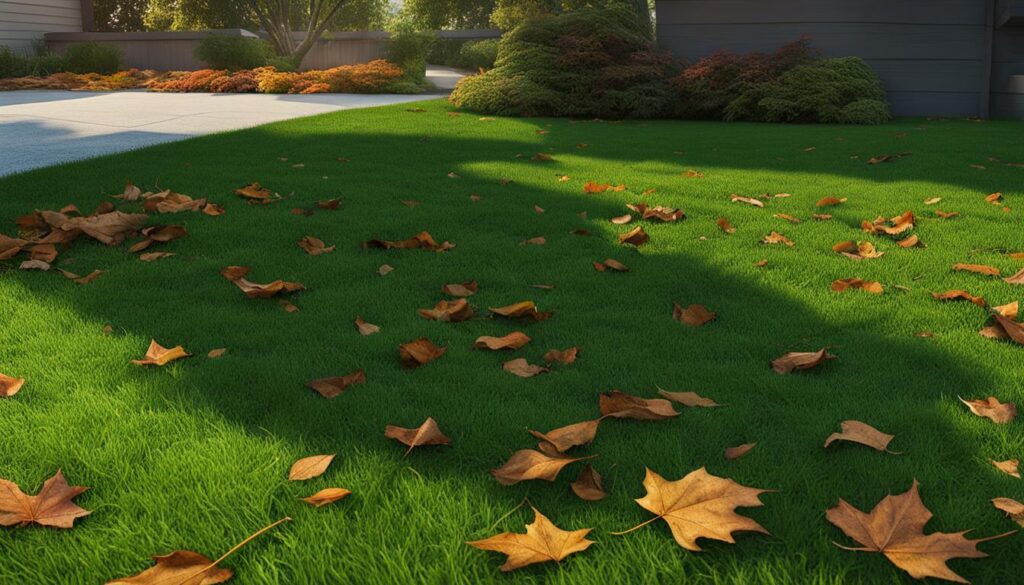
Dead Leaves as Nutrients for Plants
Dead leaves can provide valuable nutrients for plants when they decompose. As the leaf particles break down over time, they release essential nutrients that help plants develop robust root systems, leading to healthier and more vibrant growth. Instead of disposing of fallen leaves, you can harness their nutrient-rich properties to benefit your garden.
Composting Dead Leaves
One effective way to utilize dead leaves is by creating compost. You can pile up the leaves in a designated corner of your backyard and allow them to break down naturally. To enhance the composting process, mix the leaves with other organic materials like grass clippings and kitchen scraps. This mixture will provide a balanced blend of carbon and nitrogen, promoting decomposition and ensuring a nutrient-rich compost.
Once the dead leaves have fully decomposed, the resulting compost can be used as a natural fertilizer for your plants. It improves soil health and structure, enhances nutrient retention, and promotes beneficial microbial activity. By incorporating this homemade compost into your gardening routine, you can nourish your plants with the nutrients they need to thrive.
Benefits of Dead Leaf Compost
Using compost made from dead leaves offers several advantages for your plants and garden. Firstly, it enriches the soil with organic matter, improving its overall fertility and ability to retain moisture. The compost also enhances the soil’s structure, promoting better aeration and drainage. These factors contribute to healthier root systems and more robust plant growth.
Furthermore, the use of dead leaf compost can help suppress weed growth by creating a protective layer over the soil. This layer prevents weed seeds from germinating and competing with your desired plants for resources. By using compost as a natural weed barrier, you can reduce the need for chemical herbicides and maintain a cleaner and healthier garden environment.
| Benefits of Dead Leaf Compost |
|---|
| Enriches soil fertility |
| Improves moisture retention |
| Enhances soil structure |
| Suppresses weed growth |
By incorporating dead leaves into your composting practices, you can not only minimize waste but also harness their nutrient-rich properties to support the health and vitality of your plants. This sustainable approach to gardening promotes a thriving ecosystem within your garden while reducing reliance on synthetic fertilizers and harmful chemicals.
Dead Leaves as Mulch
One of the key benefits of using dead leaves in your garden is their effectiveness as mulch. Mulching with dead leaves can help retain moisture in the soil, preventing it from drying out during periods of low rainfall or high temperatures. The layer of mulch formed by the leaves acts as a protective barrier, reducing evaporation and maintaining a more consistent level of moisture for the plants. This is especially important for thirsty plants or areas with poor water retention.
In addition to moisture retention, dead leaves used as mulch also help suppress weed growth. The layer of mulch blocks sunlight from reaching the soil, inhibiting weed seeds from germinating and establishing themselves. By preventing weeds from growing, dead leaf mulch reduces competition for nutrients and resources, allowing your plants to thrive without having to compete with unwanted vegetation.
When using dead leaves as mulch, it is important to shred them before spreading them on the soil. Shredding the leaves helps break them down more quickly, allowing for better incorporation into the soil over time. You can use a lawn mower with a bag attachment or a leaf shredder to achieve finely shredded leaves. This not only helps with decomposition but also prevents the mulch from matting together and creating a barrier that can hinder water and air movement in the soil.
The Benefits of Dead Leaf Mulch
Using dead leaves as mulch in your garden has several advantages:
- Moisture retention: Dead leaf mulch helps keep the soil moist, reducing the need for frequent watering.
- Weed suppression: By blocking sunlight, dead leaf mulch inhibits weed seed growth and reduces the need for manual weeding.
- Organic matter: As the leaves break down, they add organic matter to the soil, improving its structure and fertility.
- Nutrient cycling: Dead leaves release nutrients as they decompose, enriching the soil and providing essential elements for plant growth.
By utilizing dead leaves as mulch in your garden, you can create a more sustainable and environmentally friendly approach to gardening. Not only will you reap the benefits of improved soil health and plant growth, but you will also reduce waste by making use of a readily available resource.
Comparing Different Types of Mulch
| Mulch Type | Moisture Retention | Weed Suppression | Organic Matter | Nutrient Cycling |
|---|---|---|---|---|
| Dead Leaf Mulch | High | Effective | High | Yes |
| Wood Chips | High | Effective | Low | No |
| Straw | Medium | Ineffective | Low | No |
| Grass Clippings | Medium | Ineffective | Medium | Yes |
Other Uses for Dead Leaves
Dead leaves can be utilized in various ways beyond mulching and composting. They have practical applications for insulation and can benefit root vegetables while also being transformed into beneficial leaf mold. Here are some additional uses for dead leaves in your garden:
Insulation
One way to repurpose dead leaves is by using them as insulation for sheds, small structures, or even garden beds. By piling up a thick layer of leaves inside these spaces and covering them with plastic sheeting, you can create a natural insulation barrier. This method can help regulate temperature and protect fragile plants or stored items from harsh elements.
Protecting Root Vegetables
Root vegetables like carrots and leeks can benefit from the insulating properties of dead leaves. Before the first frost, pile a layer of leaves over the soil surrounding these vegetables. The leaves act as a protective blanket, helping to maintain a more stable soil temperature and preventing freezing. This method extends the harvest period, allowing you to enjoy fresh produce for longer.
Creating Leaf Mold
Leaf mold is a dark, nutrient-rich soil conditioner that can greatly benefit your garden. To create leaf mold, pile up dead leaves in a corner of your yard or garden. Over time, the leaves will break down, resulting in a crumbly, dark material that can be used as a mulch or incorporated into potting soil. Leaf mold is particularly rich in calcium and magnesium, providing essential nutrients for healthy plant growth.
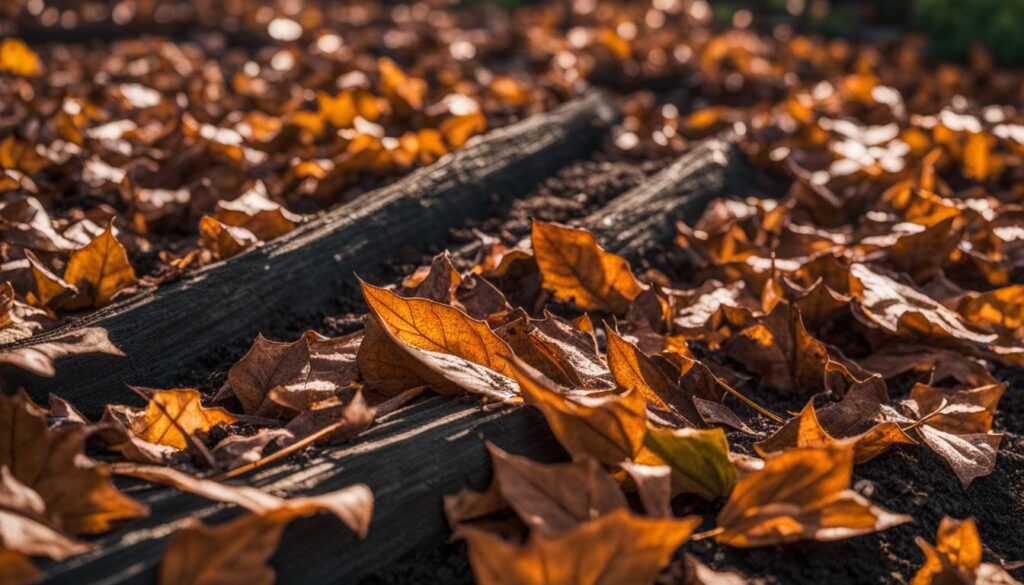
| Method | Benefits |
|---|---|
| Insulation | Regulates temperature in sheds and small structures |
| Protecting Root Vegetables | Prevents freezing and extends the harvest period |
| Creating Leaf Mold | Produces nutrient-rich soil conditioner for improved plant growth |
By exploring these additional uses for dead leaves, you can maximize their potential in your garden. From providing insulation to protecting root vegetables and creating nutrient-rich leaf mold, dead leaves offer a range of benefits beyond traditional mulching and composting methods.
Can Plants Grow Without Soil If Dead Leaves Are Used Instead?
Can plants grow without soil if dead leaves are used instead? This concept of plant growth without soil, also known as hydroponics, involves replacing soil with a nutrient-rich solution to support plant growth. While dead leaves can add organic matter to the solution, they may not provide enough nutrients for the plants to thrive. However, dead leaves can be composted and turned into nutrient-rich soil, which can then be used to grow plants successfully.

| Method | Benefits |
|---|---|
| Insulation | Regulates temperature in sheds and small structures |
| Protecting Root Vegetables | Prevents freezing and extends the harvest period |
| Creating Leaf Mold | Produces nutrient-rich soil conditioner for improved plant growth |
By exploring these additional uses for dead leaves, you can maximize their potential in your garden. From providing insulation to protecting root vegetables and creating nutrient-rich leaf mold, dead leaves offer a range of benefits beyond traditional mulching and composting methods.
Conclusion
In conclusion, dead leaves can play a vital role in promoting plant growth and soil enrichment in your garden. By using fallen leaves correctly, you can harness their benefits and create a thriving garden ecosystem.
Though it is essential to avoid using dead leaves on your lawn or in areas where they may hinder plant health, such as fall- and winter-interest plantings, you can still make the most of them in other areas. Fallen leaves can enrich the soil as they decompose, returning valuable nutrients that help plants build robust root systems.
Additionally, dead leaves can act as a natural mulch, helping to retain moisture in the soil and suppress weed growth. By shredding them with a lawn mower before using them as mulch, you can enhance their effectiveness and ensure optimal results.
Moreover, dead leaves provide a habitat for important insect species over winter, contributing to the overall biodiversity of your garden. They can also be used in other ways, such as insulation for sheds or as a soil conditioner when allowed to decompose into leaf mold.
By understanding how to incorporate dead leaves properly, you can reap the benefits they offer and see healthier plant growth in your garden. So, the next time you see those fallen leaves, don’t overlook their potential to enrich your garden and create a thriving ecosystem.
FAQ
Do dead leaves help plants grow?
Yes, dead leaves can help plants grow when used correctly. They can enrich the soil, provide nutrients, and act as natural mulch.
How do dead leaves improve lawn health?
Mowing over dead leaves and distributing them as leaf mulch throughout the lawn can prevent moss growth and promote robust root systems in the grass.
Can dead leaves provide nutrients for plants?
Yes, when dead leaves decompose, they release nutrients that help plants build resilient root systems. They can also be used to create compost, which can be used as fertilizer for plants.
What are the benefits of using dead leaves as mulch?
Dead leaves make excellent mulch as they help retain moisture in the soil, suppress weed growth, and are easy to collect. Shredding the leaves with a lawn mower before using them as mulch is recommended.
What are some other uses for dead leaves?
Dead leaves can be used for insulation in sheds or to insulate root vegetables stored in the ground. They can also be used to create leaf mold, a soil conditioner that is beneficial for potting soils, vegetable patches, and flower beds.
How do dead leaves benefit plant growth?
Dead leaves can enrich the soil, provide habitat for wildlife, act as natural mulch, and contribute to composting efforts, all of which promote healthier plant growth.





